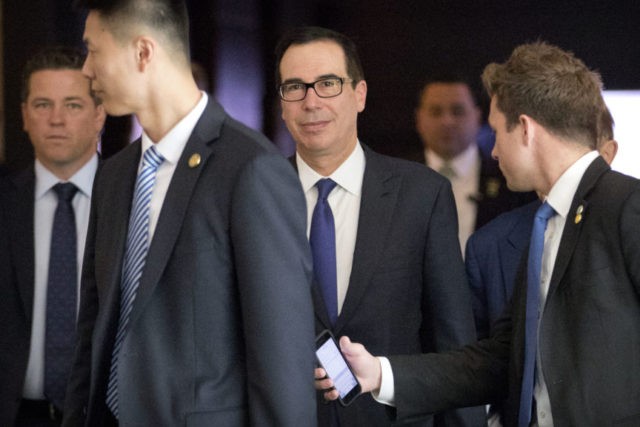BEIJING (AP) — Chinese and American officials meeting in Beijing agreed to set up a mechanism to work through an escalating dispute over trade at the end of talks Friday, Chinese state media said. But it said “big differences” remain on some matters.
The Commerce Ministry said the two sides discussed expanding U.S. exports to China, trade in services, the protection of intellectual property rights and how to resolve the use of tariffs and non-tariff measures, according to the official Xinhua News Agency.
The two sides “reached consensus in some areas,” Xinhua said. It did not provide specifics.
There was no immediate comment from the U.S. delegation. A motorcade was seen leaving the U.S. Embassy in Beijing on Friday afternoon. The group was expected to depart in the evening.
Earlier Friday, U.S. Treasury Secretary Steven Mnuchin sounded a positive note about the two days of talks, saying that they were having “very good conversations.”
U.S. President Donald Trump was seeking to cut the chronic U.S. trade deficit by $100 billion and gain concessions on policies that foreign companies say force them to share technology in order to gain market access.
His administration has threatened to impose new tariffs on roughly $150 billion in Chinese goods. That prompted China to announce its own tariffs on U.S. goods.
It was unclear if the talks had cleared the air enough to stave off such potentially damaging moves and alleviate uncertainty for investors and businesses likely to be affected but such measures.
Analysts had said chances for a breakthrough from the talks appeared slim given the two sides’ intensifying rivalry in strategic technologies, where China lags behind the U.S.
Under Xi, a program known as “Made in China 2025” aims to make China a tech superpower by advancing development of industries that in addition to semiconductors includes artificial intelligence, pharmaceuticals and electric vehicles. The plan mostly involves subsidizing Chinese firms. But it also requires foreign companies to provide key details about their technologies to Chinese partners.
The group led by Mnuchin included Commerce Secretary Wilbur Ross, U.S. Trade Representative Robert Lighthizer and White House trade advisor Peter Navarro, a fierce China critic. Liu He, President Xi Jinping’s top economic adviser, headed the Chinese side in the talks.

COMMENTS
Please let us know if you're having issues with commenting.